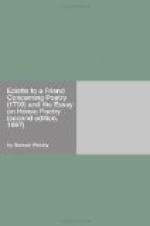But Boileau comes to a stronger Objection, both against the Names and use of these Daemons, by way of Machine, I mean, in Christian Poetry;
The Mysteries we Christians must believe
Disdain such shifting Pageants to receive.
Thus has his Translator turn’d him; and taking it in that Sence, the meaning must be, that it disgraces Christianity, to mix its Mysteries with Stories of Daemons, Angels, &c. But sure it can never be any disgrace, to represent it really as it is, with the frequent Intervention of those invisible and powerful Agents, both good and evil, in the Affairs of Mankind, which our Saviour has both asserted and demonstrated in his Gospel, both by Theory and Practice: Whence we learn, that there are really vast numbers of these Spirits, some tempting, or tormenting, others guarding and protecting Mortals: Nay, a subordination too among them, and that they are always vigilant, some for our Destruction, others for our Preservation, and that, as it seems, of every individual Man; and if this be true in general, I’m sure ’tis probable In particular: Nor can it be any disgrace to Christianity, to apply general Probabilities to particular Cases, or to mention these Daemons in Poetry any more than in Divinity.
But indeed the Translator has here mended Boileau’s Thought, or at least made it more plausible and defensible, tho he has miss’d his Sence; for these are his Lines:
De la foi d’une Christien les Mysteres
terribles
D’ Ornemens egayes ne sont point
susceptibles.




